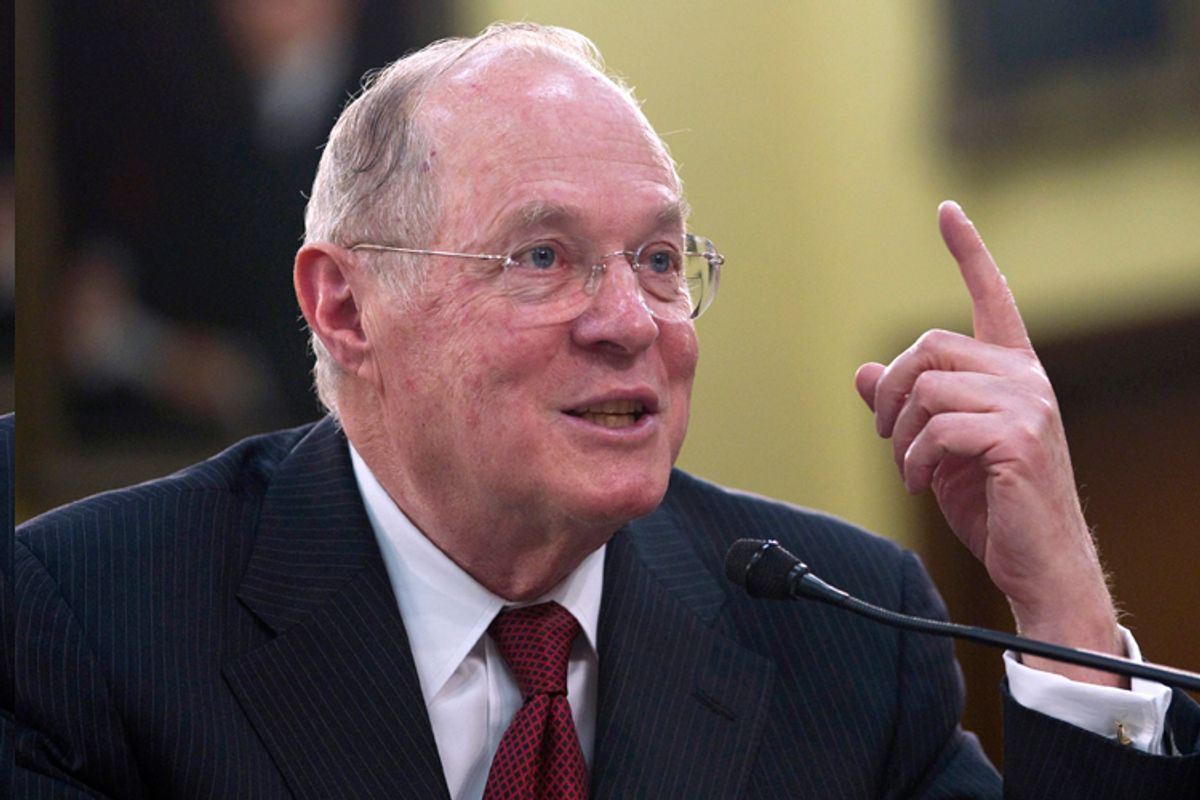Justice Anthony Kennedy has long relished his role as the swing vote on the Supreme Court -- and perhaps no more so than today, when, with his decision to make a 5-4 majority to strike down the Defense of Marriage Act, he single-handedy helped extend legal and economic benefits to millions of Americans, change the course of American history and crystallize his legacy in the pantheon of civil rights agents.
“If Bill Clinton was ‘the first black president,’ Anthony Kennedy has now firmly secured his place in history as ‘the first gay justice,'" said former Kennedy clerk Michael Dorf, who now teaches law at Cornell.
Kennedy has often confounded liberals and conservatives alike with his unpredictable decision-making. "On most cases of great moment, the intellectual battlefield of the Supreme Court has shrunk to the space between this one man's ears," Time magazine's Massimo Calabresi and David Von Drehle wrote in their 2010 profile of the justice.
But on gay rights, Kennedy is atypically consistent. "As the author of Romer v. Evans, Lawrence v. Texas and now United States v. Windsor, Justice Kennedy makes clear that he not only accepts, but welcomes the task of writing majestic opinions affirming the dignity of gay persons and couples," Dorf added.
In Romer v. Evans, Kennedy wrote the majority opinion striking down a Colorado constitutional amendment that would have outlawed giving LGBT people status as a protected class. "The law is at once too narrow and too broad," Kennedy wrote in 1996. "It identifies persons by a single trait and then denies them protection across the board. The resulting disqualification of a class of persons from the right to seek specific protection from the law is unprecedented in our jurisprudence."
Romer was the first Supreme Court case to deal with LGBT rights since Bowers v. Hardwick, the 1986 decision that upheld the constitutionality of laws criminalizing sodomy. Kennedy's opinion paved the way for future decisions that would expand the rights to gay Americans, many of which would also be written by Kennedy.
The next landmark decision came in 2003, when the court threw out anti-sodomy laws for good in Lawrence v. Texas. Kennedy again wrote the majority opinion in the 6-3 ruling, stating that outlawing "homosexual conduct" is "an invitation to subject homosexual persons to discrimination both in the public and in the private spheres."
Today, again writing the opinion of the 5-4 majority to overturn DOMA, Kennedy wrote that the law violates a slew of bedrock liberties guaranteed to Americans by the Constitution. "DOMA’s avowed purpose and practical effect are to impose a disadvantage, a separate status, and so a stigma upon all who enter into same-sex marriages made lawful by the unquestioned authority of the States," he wrote.
Kennedy's long support for gay rights has naturally made him an enemy of the social conservatives standing up for "traditional marriage." Maggie Gallagher, the former president of the National Organization for Marriage, said today that Kennedy was "unfair" and "illegitimate" in his ruling. "Kennedy’s decision is not law, it is Justice Kennedy’s moral values written into our Constitution, and interfering with our rights as Americans to pass laws that accord with our values on marriage," she said.
Still, Kennedy can, as Jeffrey Toobin wrote, "swing wildly in one direction or the other." He's no great hero to liberals, writing the majority opinion on Citizens United and often siding the wrong way on abortion cases. And it was Chief Justice John Roberts who proved to be the swing vote to uphold Obamacare -- Kennedy joined the dissent.
Rather than view it as fickle, Dorf sees Kennedy's jurisprudence as consistent with a libertarian-leaning egalitarianism, typical of the California Republican style. "He's someone who, had his career taken a slightly different course, would be a governor of California in the mold of Pete Wilson or Arnold Schwarzenegger," Dorf told Salon of the Sacramento native.
This is how Kennedy can rule against affirmative action one day, and in favor of marriage equality two days later. He doesn't like "the government putting people in boxes, whether that's race or sexual orientation," Dorf explained.
And as Dahlia Lithwick wrote last year, while Kennedy often seems inscrutable or mercurial, he is really more like "the original independent swing-state voter." "Like most Americans, he’s not as conservative as the other four conservatives on the court. Nor, like most Americans, is he as liberal as the four liberals," Lithwick wrote. "He is in fact most representative of that elusive Every American."
In that sense, Kennedy is effectively channeling Every Americans' increasing embrace of marriage quality and civil rights for all.

Shares